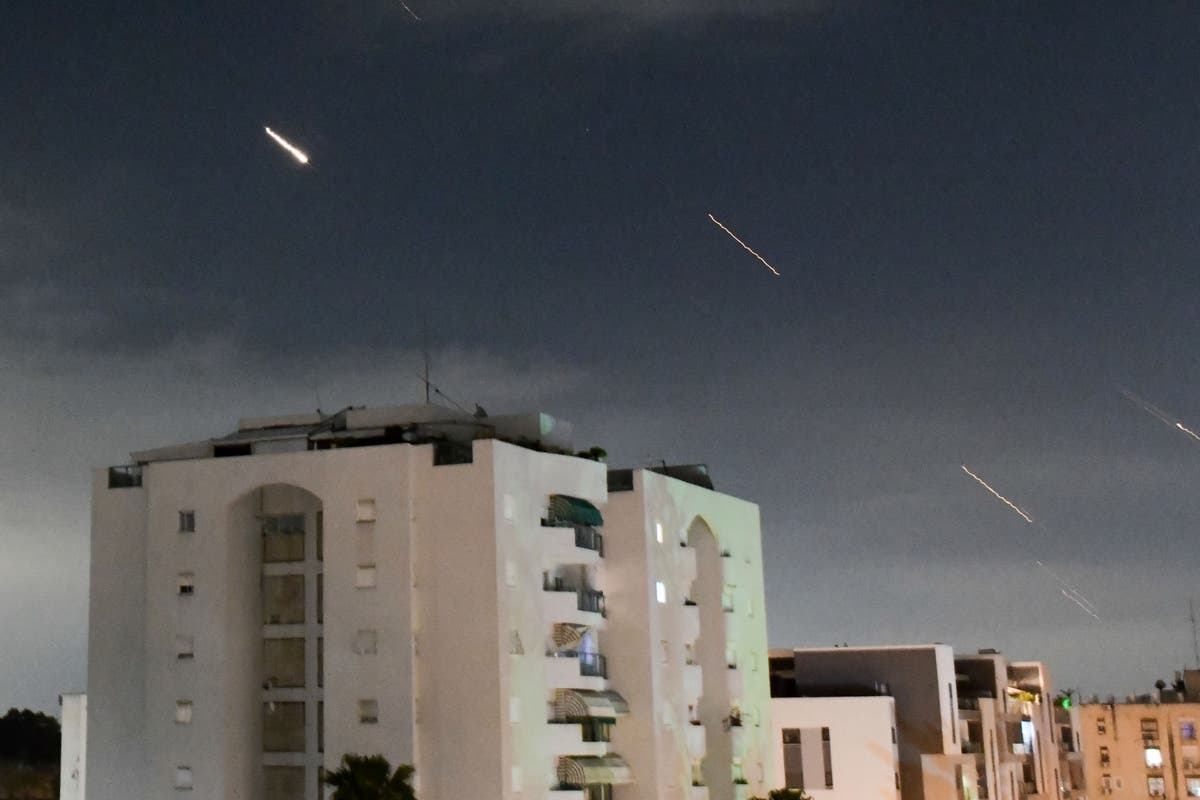Israel has warned it will “exact a price” for Iran’s mass drone and missile attack at the weekend which tipped the Middle East one step closer to a major conflict.
Iran launched a wave of 330 drones, cruise and ballistic missiles overnight on Saturday in retaliation for an alleged Israeli strike on its consulate in Damascus, that killed two generals from Iran’s Revolutionary Guard.
Almost all of the Iranian drones and missiles were shot down by Israel and its allies – including the UK, the US, and air forces of other countries – raising the spectre of a conflict spreading across the region and beyond.
But in an attempt to lower tensions, US president Joe Biden warned Israeli prime minister Benjamin Netanyahu the US would not join a further counteroffensive, while senior White House officials said they “don’t seek a wider war in the region” or one with Iran.
Ahead of a meeting of the Israeli war cabinet on Sunday, minister Benny Gantz, the former head of the military, vowed that the “campaign is not over” and added that Iran would build a regional coalition to counter the threat from Iran “when the time is right”.
“Iran is a global problem, it is a regional challenge and it is also a danger to Israel, and yesterday, the world clearly stood together with Israel in the face of the danger,” he said.
“Faced with the threat of Iran we will build a regional coalition and exact the price from Iran in the way and at the time that suits us”.
His words were echoed by Israel’s defence minister Yoav Gallant who also spoke of establishing a “strategic alliance against this grave threat by Iran”.
Israeli president Isaac Herzog called Tehran “an empire of evil which has its proxies, led all over the region and [with] all cells all over the world”.
“We were attacked last night from four corners of the Middle East with proxies shooting at us, firing missiles and ballistic missiles, drones and cruise missiles,” he told Sky News. “This is like a real war. I mean, this is a declaration of war.”
The Israeli military meanwhile said it remains on “high alert” and is still “assessing the situation”. “Over the last few hours we approved operational plans for both offensive and defensive action,” Rear Admiral Daniel Hagari, a spokesperson, said in a televised statement.
Overnight on Saturday the skies above Israel, the occupied West Bank, Jordan and even parts of Iraq and Syria lit up with explosions as Israeli, American, British and even reportedly Jordanian jets scrambled to intercept the massive salvo.
The Israeli military said in total Iran and its proxies fired at least 170 drones, 120 ballistic missiles and more than 30 cruise missiles towards Israel, but “99 per cent” of the projectiles were intercepted. Some ballistic missiles did reach inside Israeli territory, causing minor damage to an airbase and injuring a 10-year-old girl.
Rishi Sunak said that RAF jets shot down “a number” of attack drones and warned that had Iran’s attack on Israel been successful “the fallout for regional stability would be hard to overstate”.
Fearing a regional conflict, Russia, China, France and Germany as well as Arab states Egypt, Qatar and the United Arab Emirates urged restraint, with the UN Security Council set to meet on Sunday evening to discuss the events.
President Biden also convened the G7 on Sunday. There, G7 leaders said they “stand ready to take further measures now and in response to further destabilising initiatives” following Iran’s unprecedented attack but warned further regional escalation “must be avoided”.
In a statement after the attacks, President Biden told Mr Netanyahu that Israel had “demonstrated a remarkable capacity to defend against and defeat even unprecedented attacks”.
But a White House official revealed that he said the US would not participate in any Israeli counteroffensive. John Kirby, the White House’s top national security spokesperson, said the US will continue to help Israel defend itself, but does not want war with Iran.
“We don’t seek a wider war in the region. We don’t seek a war with Iran. And I think I will leave it at that,” Mr Kirby added.
Tensions have boiled in the Middle East after Israel launched its heaviest-ever bombardment of Gaza, in retaliation for Hamas’s 7 October attack on southern Israel during which around 1,100 people died and 250 were taken hostage.
Since then Israel’s bombardment has killed more than 33,000 people in Gaza, according to the Palestinian health ministry and pushed the besieged strip to the brink of famine.
It has also triggered cross-border fighting with Iran-backed groups, including Hezbollah in Lebanon. That front threatened to widen after Israel bombed the Iranian consulate in Damascus on 1 April.
Iran presented its drone and missile attack as retaliation for “Israeli crimes”, but was quick to say it now “deemed the matter concluded” unless there were further attacks.
Iranian foreign minister Amir Abdollahian said Tehran had even informed the US its attack would be “limited” and for self-defence. He also said that regional neighbours had also been informed of its planned strikes 72 hours in advance.
The concern is Israel’s response. Iranian army chief of staff Major General Mohammad Bagheri told state television that “our response will be much larger… if Israel retaliates against Iran” including possibly attacking American bases in the region.
Israeli diplomats and security officials believe a forceful response is inevitable, although it has not been decided yet whether it will be on Iran itself, or its proxies – Hezbollah in Lebanon, Shia militias in Syria and Iraq and the Houthis in Yemen.
“The indication from DC is that the US will not join an operation directly against Iran. But apart from that they are certainly not telling us what to do,” said a former Mossad officer who is temporarily back at the Interior Ministry since the Gaza war started.
“The priority is to ensure that we don’t face such an assault again from Iran, and also deter its proxies like Hezbollah which have been regularly attacking Israel. I think the war cabinet will want to keep all options open to try and deal with the multiple threats we are facing.”
Israeli defence experts said amid the mounting pressure from the US, Israel wouldn’t dare go for “full escalation”.
“They might do something symbolic like a specific attack on one designated target,” said Amos Harel, a non-resident senior fellow at Brookings.
Iran, meanwhile, assumes the US does not want a regional escalation that could lead to an all out war, said Holly Dagres, Iran expert and senior fellow at the Atlantic Council.
“But while there is an assumption that cooler heads will prevail, Israel can and will act on its own,“ she told The Independent.
It is not clear what the level of Israeli response will be. Mr Netanyahu is in a “political fight for his life” Ms Dagres said, adding to the confusion.
His popularity has tanked since 7 October, he is facing questions about how Hamas’ attack was able to happen and is standing three trials on corruption and graft charges, that he denies.

